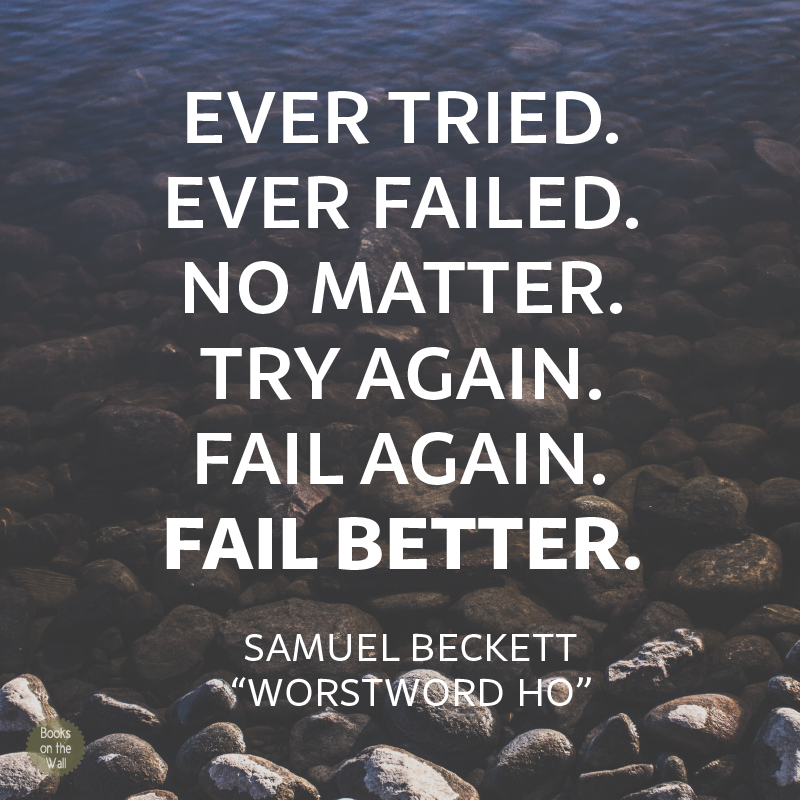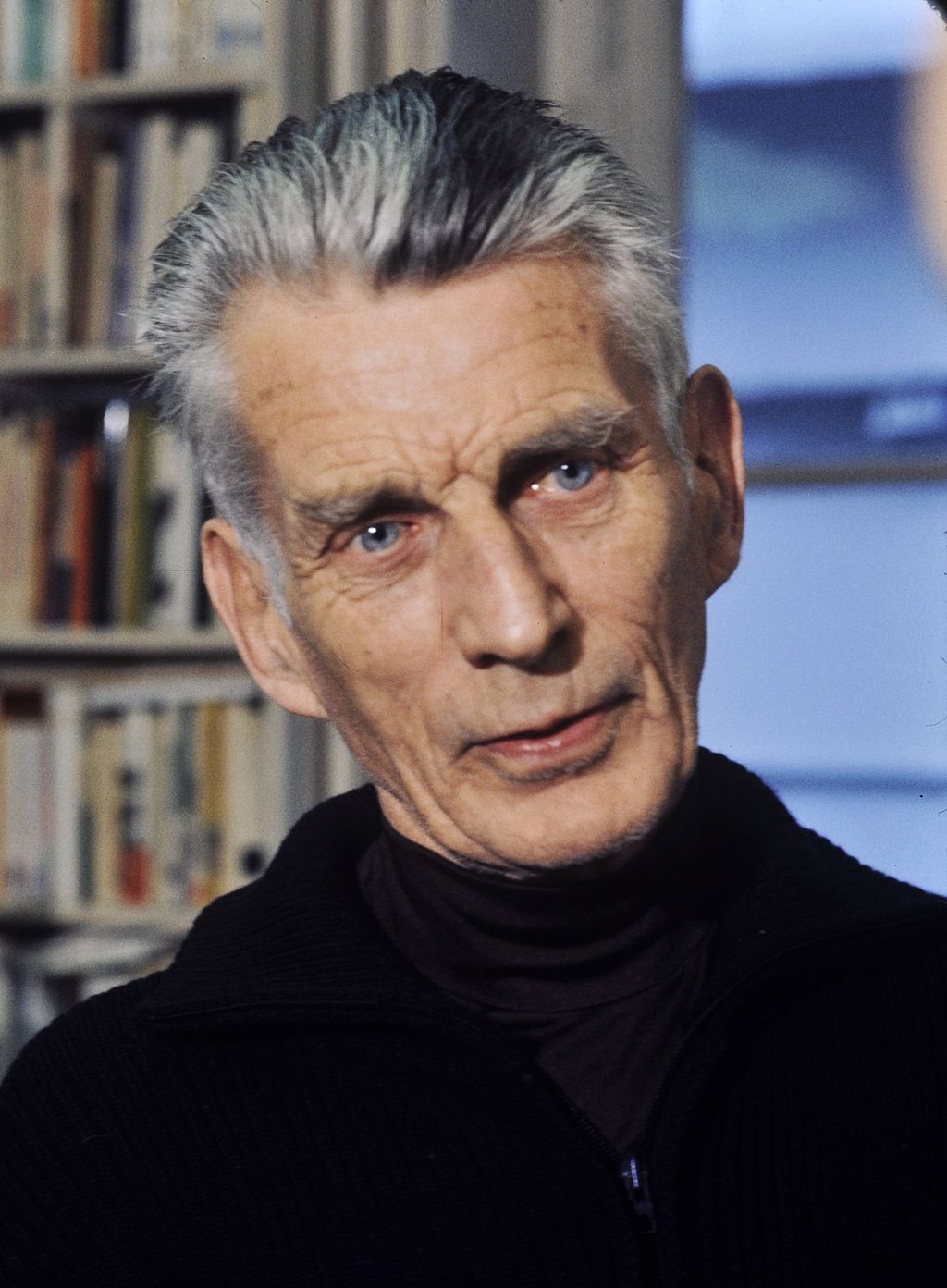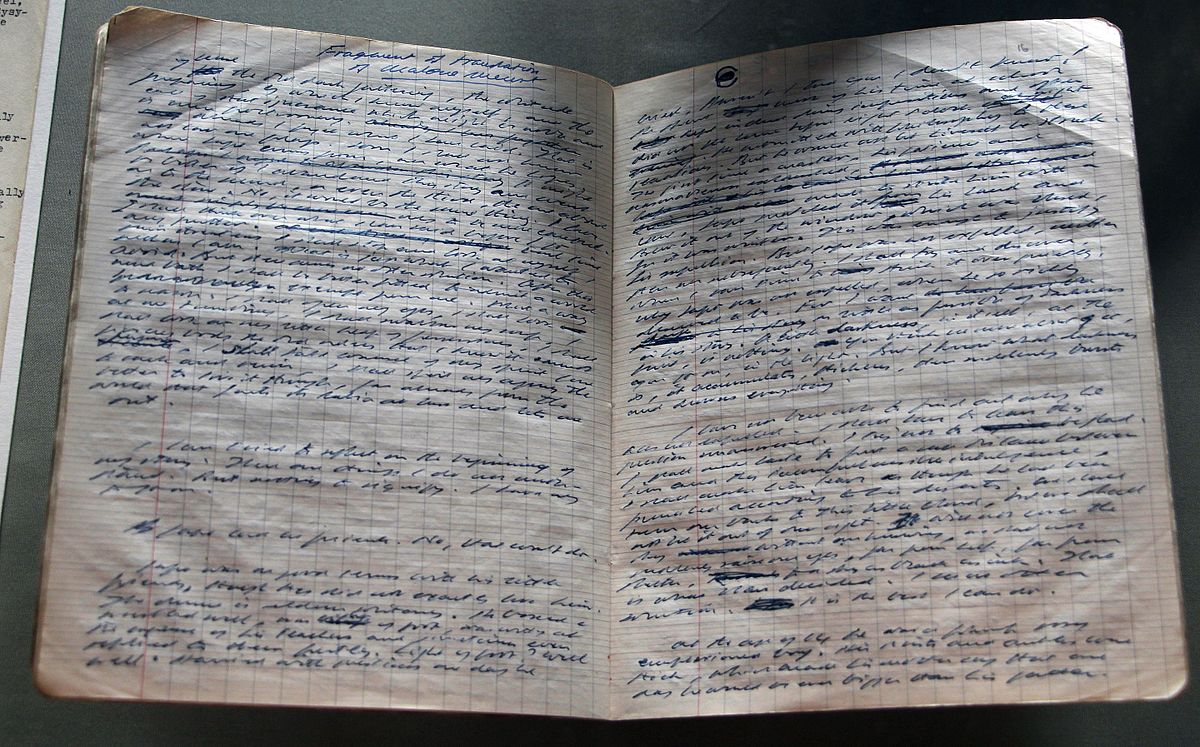Ever Tried Ever Failed
Samuel Beckett: Fail Better and "Worstward Ho!"
Today we're featuring a Samuel Beckett quote that has gained immense popularity in recent years. You may not accept known that this quote comes from Irish gaelic author Samuel Beckett, simply there'southward no incertitude you know the words.

Even if you aren't involved in tech, entrepreneurship, lifehacking, or other such digital-historic period ubiquities, you've probably heard the nearly famous role of this Samuel Beckett quote: "Fail better."
The "Neglect Improve" Quote by Samuel Beckett
The "fail better" quote was originally published in Samuel Beckett'south brusque piece of prose entitled Worstward Ho!, his second-to-concluding work ever published. The full Samuel Beckett quote reads like this (and by "total," we actually mean the part that gets repeated):
"Always tried. Ever failed. No matter. Endeavour again. Fail again. Fail amend."
By itself, you can probably understand why this phrase has get a mantra of sorts, especially in the glamorized world of overworked get-go-upwards founders hoping against pretty high odds to make information technology.
Fifty-fifty exterior of the business evolution niche, this quote does audio inspiring. Correct?
Nosotros think so, as well. That is…until you lot read the rest of information technology.
Is the "Neglect Amend" Quote Actually Inspirational?
Here'due south the continuation of that Samuel Beckett quote, the part that immediately follows the famously catchy bit (our emphasis added):
"Kickoff the torso. No. First the place. No. Beginning both. Now either. Now the other. Ill of the either effort the other. Sick of it back ill of the either. So on. Somehow on. Till ill of both. Throw up and go. Where neither. Till sick of there. Throw up and back. The trunk again. Where none. The place again. Where none. Try again. Fail again. Amend once more. Or better worse. Neglect worse again. Nevertheless worse over again. Till sick for good. Throw upwardly for good. Go for skillful. Where neither for practiced. Adept and all."
As this markedly darker snippet of text demonstrates, Worstward Ho! seems to accept nada to do with positivity, motivation, or progress.
In fact, it seems that the simply recompense Beckett'south narrator can come up with for the applesauce of existence is to "fail improve" the adjacent time.
Non exactly inspiring, right?
The Meme-ification of the "Fail Improve" Samuel Beckett Quote
In Beckett's bleak worldview, life is already a g failure (or a tragi-comedy, if y'all'd adopt) in which we are all, like the narrator ofWorstward Ho!, sitting in an inexplicable "dim void." The fact that this Samuel Beckett quote has been taken and so far from its original roots is pretty fascinating.
Marker O'Connell, a author forSlate, describes the ironic meme-ification of the "fail better" quote similar this:
"The entrepreneurial way for failure with which this polished shard fits so snugly is non actually concerned, as Beckett was, with failure per se—with the necessary defeat of every human effort, of all efforts at advice, and of linguistic communication itself—only with failure every bit an essential stage in the individual's progress toward lucrative self-fulfillment."
Every bit O'Connell notes, Samuel Beckett was interested in failure, total cease. Not failure equally a necessary path toward riches, or fame, or (anybody's favorite buzzword) "innovation." Just failure.
The "Dim Void:" Beckett'sWorstward Ho!
Except for this one "fail better" quote, near every other snippet fromWestward Ho! reflects the real Samuel Beckett: heart-searching, morbid, and completely avant-garde.
Indeed, far from encouraging techie CEOs to achieve their greatest potential, Beckett'due south principal obsession inDue west Ho! is "the void":
"Longing that all get. Dim go. Void go. Longing go. Vain longing that vain longing get."
In many means, this text tin be seen as an extended meditation on the inexplicable nature of being and not-being. Beckett'south narrator seems to be trying to work out the paradox of emptiness and presence, of birth and death.
Worstward Ho! vs. West Ho!
The title ofWorstward Ho! is a riff on the 19th century novelDue west Ho! by the English novelist Charles Kingsley, offering a very contrasting view of life.
While the phrase "Due west Ho!" is associated with expansion, growth, and dandy optimism for the futurity, Beckett'due south championship reminds us that, ultimately, we are all journeying "worstward" towards the grave…
…and perhaps back again. It's not quite clear, just some people see the theory of reincarnation in this work, just every bit "metempsychosis" is a major theme in Joyce'sUlysses.
Unreliability of Linguistic communication
Another important theme inWorstward Ho! (again, something skipped over in the famous Samuel Beckett quote) is the narrator's lack of faith in linguistic communication. After in the piece, Beckett writes the following:
"With leastening words say least best worse. For want of worser worse. Unlessenable least best worse."
This phrase succinctly encapsulates Beckett'southward later minimalist aesthetics. You can also see the unreliability of linguistic communication as "word" well-nigh slips into "worse" in this quote.
What DoesWorstward Ho!Fifty-fifty Hateful?
A few literary critics have tried to classifyWorstward Ho! as a novella, but it's quite hard to brand out a articulate plot in this text. Readers who support the theory thatWorstward Ho! is a novella betoken out that this text is mainly about an old man, an old adult female, and a child visiting a graveyard. It'due south left up to us, perchance, to fill in the blanks surrounding these three figures.
Every bit with many of Beckett's other works, in that location's a great deal of disagreement over whatWorstward Ho! actually "means." The woman, human being, and child might be symbolic of stages in the human condition. Or they might not.
Equally with whatever other piece of work of fiction, readers only get out of Beckett's text every bit much every bit they put into it.
Samuel Beckett: And then Much More Than "Fail Amend"
A Nobel Prize-winning writer, Samuel Beckett's been called many things: Avant-garde. Night. Intense. Depressive.
But inspiring? Non and then much.

Samuel Beckett Portrait [Public Domain], via Wikimedia Commons
In fact, Morris Dickstein at The New York Times Book Review says this of Beckett's life and work:
"He arrived early at an extremely bleak view of life and a sense of the peculiarity of his ain detached and morbid temperament."
To empathize more about this famous Irish author—and see what's beyond his out-of-context "neglect better" quote—allow'south take a petty deeper look at his life.
Friendship with Joyce and WWII
Samuel Beckett was born in 1906 in Dublin and was raised in a Protestant household.
Later on receiving his BA in Romance languages at Trinity College, Beckett moved to Paris where he became close friends with beau Irish writer James Joyce. Beckett learned a great bargain about writing from Joyce and helped the smashing author with his terminal novelFinnegans Wake.
When World War II broke out, Beckett remained in French republic and worked with resistance fighters. For his efforts, Beckett was awarded the Croix de Guerre from the French government in 1945. Earlier the war, Beckett mainly wrote essays on literary criticism. The only work from this menses students read today is Beckett's assay of French writer Marcel Proust.
Avant-Garde Theater and Literary Development
Most literary historians concur that Beckett'due south starting time swell novel wasWatt, which was published in 1953. Beckett then published a major trilogy of novels calledMolloy,Malone Dies, andThe Unnamable.
But it wasn't until he produced his archetype absurdist drama Waiting For Godotthat Beckett became a celebrity of Avant-garde theatre.
Beckett spent the balance of his life by and large moving betwixt the Marne Valley and Paris. He was a famously reclusive writer who rarely gave interviews, although he was generous with his time for serious artists that sought him out.
Equally he matured, Beckett tried to parse down his prose to the blank essentials. In fact, some of Beckett'southward later works (like the thirty-second play "Breath") had no words at all.
Beckett's style of prose went in the verbal opposite of his mentor James Joyce. Whereas Joyce'due south works expanded over time, Beckett's later texts had fewer and fewer words. A few of the great works from his eye and late career include:
- Endgame
- Eh Joe
- Krapp's Terminal Record

Manuscript of Embers, a one-human activity radio play by Samuel Beckett, by Dmitrij Rodionov, via Wikimedia Commons
Nobel Prize in Literature and Later Life
The Nobel Prize Committee awarded Beckett the Nobel Prize in Literature in 1969. Although he accepted the honour, he didn't make a speech and he generously gave abroad all of his prize coin.
Beckett passed away in 1989, simply a few months later on his married woman Suzanne Déchevaux-Dumesni. The two were buried in the French capital letter's famous Cimetière de Montparnasse.

Samuel Beckett Bridge, Dublin, by Surrell, via Wikimedia Commons
To honor the great writer, Parisian officials (peradventure ironically) named the Allée Samuel Beckett most the infamous Catacombs in his accolade. In 2007, Dublin also honored the influential writer with the Samuel Beckett Bridge over the River Liffey.
Mostly all of Beckett's works explore heavy themes:
- Death
- Memory
- Language'due south relationship to reality
Although Beckett is often seen equally a morbid writer, he oft injects his own unique sense of Irish gaelic sense of humour into many of his plays and novels. Much like Joyce's work, many of Beckett'southward texts are full of references to some of his favorite authors in the Western literary catechism, especially Dante Alighieri.
Connections Between Beckett and Dante
Beckett was a great admirer of Dante'south poesy. It's even possible that Beckett had the final lines ofParadiso in heed when he composed some sections ofWorstward Ho!
As Dante stands before God in the finale to his grand epic, he utters these unforgettable verses:
Hither force failed my high fantasy; but my
Desire and volition were moved already—like
A wheel revolving uniformly—by
The Love that moves the sun and the other stars.
For Dante, as it seems for Beckett besides, the highest happiness is to surrender all craving and, at least in Dante'south vision, to allow God to work through us. Unlike Dante, however, Beckett is living after the horrors of World State of war Two and after the Nietzschean "Death of God."
Just like us, Beckett is in an age far removed from the faith of the Middle Ages that inspired the soaring cathedrals all across Europe. Indeed, instead of building the thousand cathedrals, we are living amidst their rubble. With these immense suffering of Globe War II at the forefront of his mind, Beckett suggests that there's footling to be hopeful for in the atomic historic period.
Interestingly, despite all of his pessimism about the human status, there is withal a faint want in Beckett's work for spousal relationship with the divine.
Tips for Further Written report ofWorstward Ho!
Beckett'sWorstward Ho! is extremely rhythmic and relies on short staccato sentences.
When yous listen to thisprose-poem, it nigh sounds like an incantation and tin accept a hypnotic effect. If y'all practise decide to listen to this text from a trained reader, so you will want to concord a copy of the verse form in your hand to keep track of Beckett's wordplay.
A few words Beckett switches effectually in the piece include the pairs "know"/"no" and "two"/"also." As well, later in the text, Beckett uses the discussion "prey," which could be mistaken for "pray" if you lot're but listening to the poem.
There are many excellent readings ofWorstward Ho! online. Y'all can also discover Beckett's originalWorstward Ho! text alongside helpful glosses by Colin Greenlaw on this webpage.
"Fail Meliorate": What Does It All Hateful?
Here at Books on the Wall, we beloved excavation into quotes and all things quote related—from what piece of work the quote came from, what the author meant by it, how modernistic order has interpreted it, and whether the supposed writer fifty-fifty wrote the quote in the beginning place.
When you outset looking deeper into the many quotes that float around our collective conscience and the internet (and in this case, on tennis player Stan Wawrinka'due south tattooed arm), you'll run into pretty quickly that at that place'southward always more to the story than the footling bit of text that happened to become famous.
And by now, yous'll realize that this is definitely true of this particular Samuel Beckett quote.

And this all raises an interesting question: Does a quote'due south context matter?
If not for the misplaced fame of this Samuel Beckett quote, tons of people would never accept even heard of this groundbreaking Irish author. Plus, it could exist argued that—despite its undisputed out-of-contextness—the "fail better" quote has truly inspired people, perhaps fifty-fifty changed lives.
So does it matter that its writer would probably cringe to larn how commercialized and, well, positive it's become? How much should an author's original intent colour our view of his or her words?
In the terminate, we actually don't know. Information technology'due south certainly an interesting question to consider.
What do yous think? Allow us know your thoughts in the comments below.
Recommended For Yous
Source: https://booksonthewall.com/blog/samuel-beckett-quote-fail-better/


0 Response to "Ever Tried Ever Failed"
Post a Comment